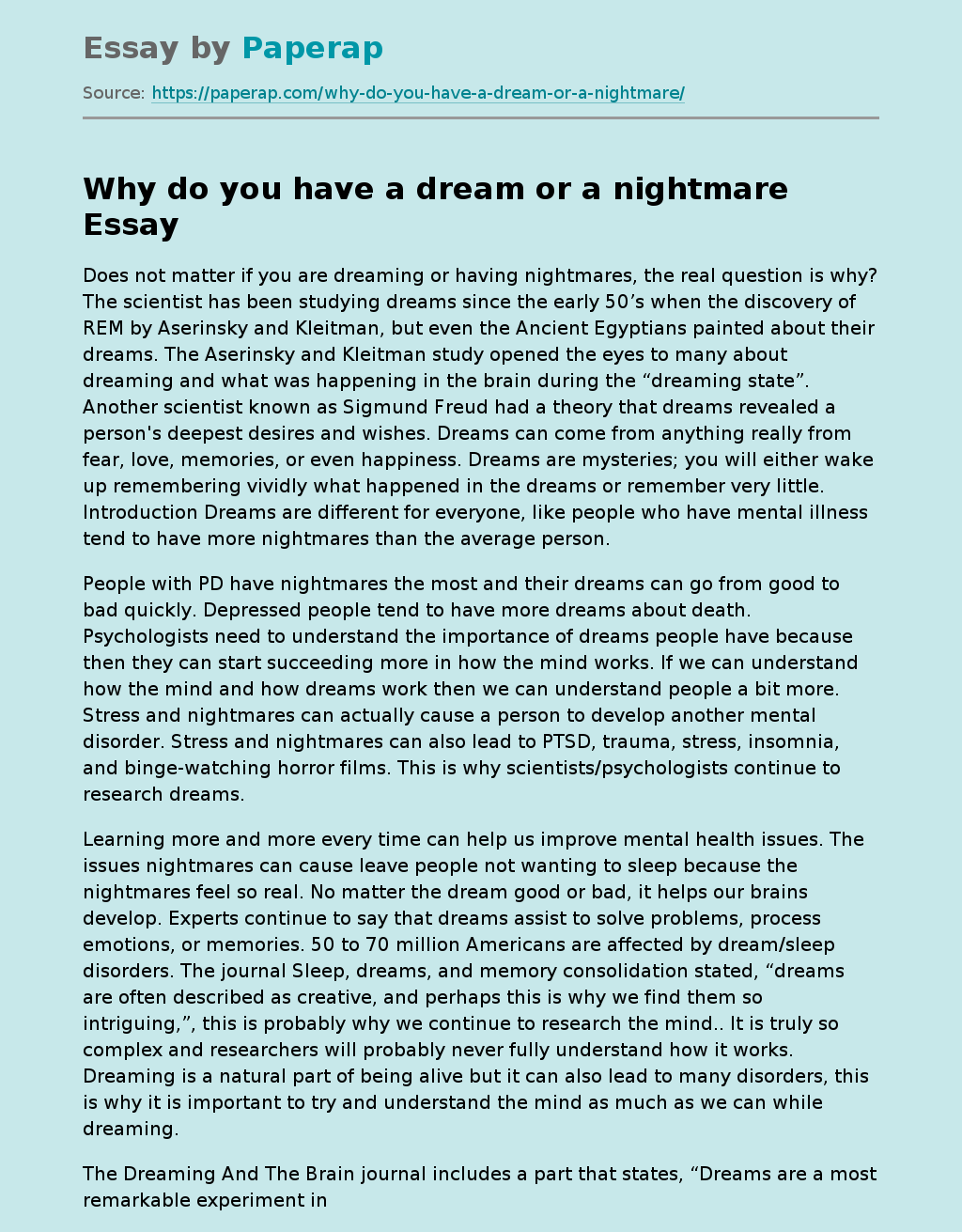Why do you have a dream or a nightmare
Does not matter if you are dreaming or having nightmares, the real question is why? The scientist has been studying dreams since the early 50’s when the discovery of REM by Aserinsky and Kleitman, but even the Ancient Egyptians painted about their dreams. The Aserinsky and Kleitman study opened the eyes to many about dreaming and what was happening in the brain during the “dreaming state”. Another scientist known as Sigmund Freud had a theory that dreams revealed a person’s deepest desires and wishes.
Dreams can come from anything really from fear, love, memories, or even happiness. Dreams are mysteries; you will either wake up remembering vividly what happened in the dreams or remember very little. Introduction Dreams are different for everyone, like people who have mental illness tend to have more nightmares than the average person.
People with PD have nightmares the most and their dreams can go from good to bad quickly. Depressed people tend to have more dreams about death.
Psychologists need to understand the importance of dreams people have because then they can start succeeding more in how the mind works. If we can understand how the mind and how dreams work then we can understand people a bit more. Stress and nightmares can actually cause a person to develop another mental disorder. Stress and nightmares can also lead to PTSD, trauma, stress, insomnia, and binge-watching horror films. This is why scientists/psychologists continue to research dreams.
Learning more and more every time can help us improve mental health issues.
The issues nightmares can cause leave people not wanting to sleep because the nightmares feel so real. No matter the dream good or bad, it helps our brains develop. Experts continue to say that dreams assist to solve problems, process emotions, or memories. 50 to 70 million Americans are affected by dream/sleep disorders. The journal Sleep, dreams, and memory consolidation stated, “dreams are often described as creative, and perhaps this is why we find them so intriguing,”, this is probably why we continue to research the mind.. It is truly so complex and researchers will probably never fully understand how it works. Dreaming is a natural part of being alive but it can also lead to many disorders, this is why it is important to try and understand the mind as much as we can while dreaming.
The Dreaming And The Brain journal includes a part that states, “Dreams are a most remarkable experiment in psychology and neuroscience, conducted every night in every sleeping person. They show that our brain, disconnected from the environment, can generate by itself an entire world of conscious experiences.” I could not love this part more because the brain is complicated enough, so trying to figure out the dreams happening in the mind during a sleeping state is even more challenging. It is insane to think about all the things researchers are continuing to learn and try to find out about the mind. Dream journals are often kept to try and analyze the dreams people are having which is a challenge that comes with trying to study dreams because many patients can wake up and not remember a thing.
Though now researchers have new technology to make it easier to try and understand what is going on in the person’s brain when dreaming. Learning more and more about dreaming can lead to bettering mental health issues. Improving someone’s dreams/sleep may not be the absolute fix but it can prevent other mental issues from occurring. There are bad perks of dreams but there are also great ones. Dreams can be memories, memories that you can vividly relive. The brain is the most powerful part of a human and dreaming is an essential piece of it. When we dream about memories we had we can feel the joy we once felt. Reliving that moment can bring us a positive attitude and happiness we thought we never could relive. A dream can bring sensations, memories, emotions, and images back to someone. I do agree with The Aserinsky and Kleitman study somewhat because dreams can be someone’s hopes and wishes. Therefore, hopes and wishes can turn someone’s attitude around, it can keep someone motivated.
Dreams do have a purpose, many psychologists believe dreams can prepare the brain from threats, the brain responding to chemicals, reflecting on experiences, or memory processing. Problem-solving is also another reason dreaming is good, some researchers believe that if you think of a problem before bed and think about it right when waking up, you might recall your dream. If you remember the dream that had to do with the problem you have you may be able to find a solution. Dreams are just ways to satisfy urges and desires. It is important for psychologists to continue learning about dreams to try and understand the mind and why we dream about the things we do. It is important as well to learn about dreams because it can save someone from gaining another mental illness, we can save lives. Many people do suffer from dream disorders and it is a great time to start learning more about what they go through to help these patients. These dreams may be complex, weird, difficult to understand, but we will continue learning about it, and figure out why the mind works the way it does.
Why do you have a dream or a nightmare. (2021, Dec 14). Retrieved from https://paperap.com/why-do-you-have-a-dream-or-a-nightmare/

